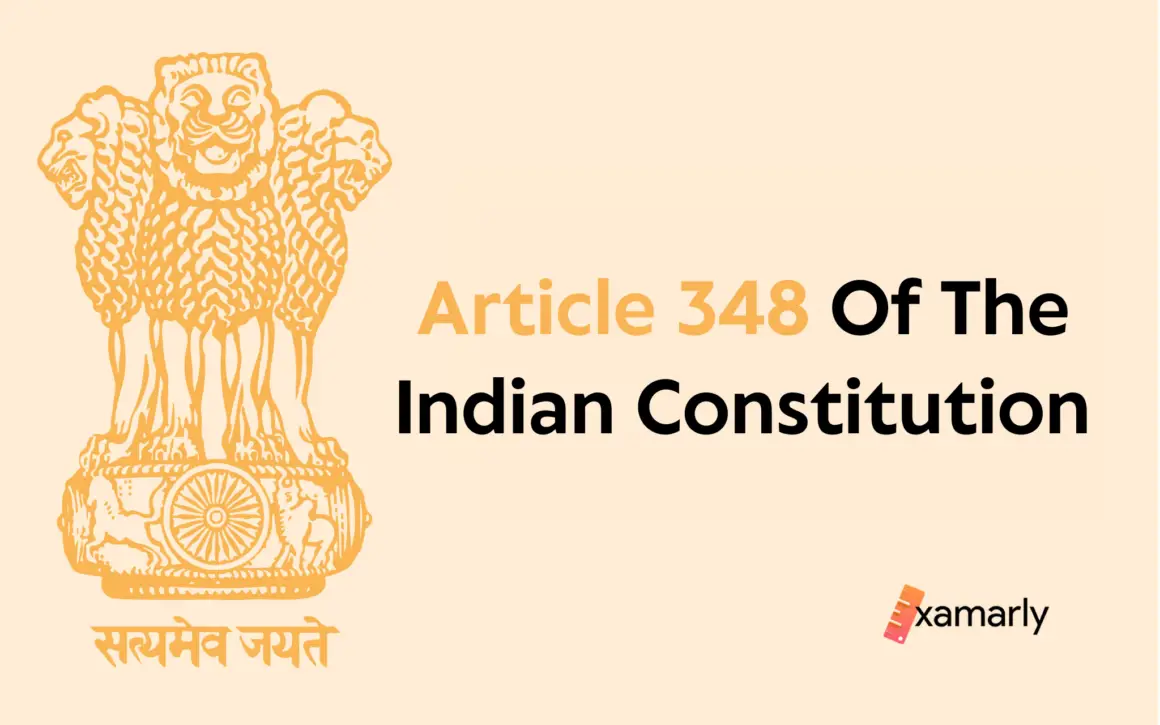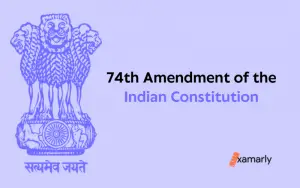An Outline
Article 348 of the Indian Constitution pertains to the language to be used in the Supreme Court and in the High Courts, as well as for acts, bills, and other legal documents.
The article states that the official language of the Supreme Court and the High Courts shall be English, but that they may also use Hindi or any other language if they deem it necessary.
Additionally, the article allows for the use of regional languages in the proceedings of the High Courts, as long as they are accompanied by a translation in English.
- An Outline
- Background Of Article 348 Of The Indian Constitution
- Article 348 Of The Indian Constitution – Language To Be Used In The Supreme Court And In The High Courts And For Acts, Bills, etc.
- Conclusion
- FAQs Related To Article 348 Of The Indian Constitution
- Which part of the Indian Constitution does Article 348 belong to?
- Which schedule of the Indian Constitution talks about Official Languages?
- When was Article 348 of the Indian Constitution adopted?
- What is the purpose of Article 348 of the Indian Constitution?
- What language is used in the Supreme Court and High Courts of India, as per Article 348?
- Are there any exceptions to the use of English in the Supreme Court and High Courts, as specified in Article 348?
- Does Article 348 of the Indian Constitution apply only when it comes to court proceedings?
- Are the acts, bills and legal documents translated into official languages by the state government or the court?
- What is the significance of Article 348 in the Indian legal system?
Background Of Article 348 Of The Indian Constitution
- Article 301F (later designated as Article 348) was not present in the original draft of the Constitution of India.
- A member of the drafting committee introduced it as part of the series of articles on the official language of the Union and States on September 12, 1949.
- The provision stated that the Supreme Court and High Courts would use English in all their proceedings, and all laws, ordinances, rules, regulations, orders, and bye-laws would also be in English.
- One member proposed a time limit of 15 years for the use of English by the courts and laws mentioned in the draft article.
- Another member suggested that the state should be given the power to use Hindi or any other language for proceedings in the concerned state’s high court, but judgements, decrees, and orders would still be in English. They also suggested that laws and rules passed in the state in another language would be accompanied by an English translation certified by the Governor.
- The assembly adopted this amendment without debate and passed Draft Article 301F with the same on September 14, 1949.
Article 348 Of The Indian Constitution – Language To Be Used In The Supreme Court And In The High Courts And For Acts, Bills, etc.
This article is an important part of the Indian Constitution as it ensures that the legal system is able to function effectively and efficiently, while also allowing for the use of languages other than English in certain circumstances.
Let’s go through its provisions and understand what they say.
Clause 1 – As it is & Explained
(1) Notwithstanding anything in the foregoing provisions of this Part, until Parliament by law otherwise provides—
(a) all proceedings in the Supreme Court and in every High Court,
(b) the authoritative texts—
(i) of all Bills to be introduced or amendments thereto to be moved in either House of Parliament or in the House or either House of the Legislature of a State,
(ii) of all Acts passed by Parliament or the Legislature of a State and of all Ordinances promulgated by the President or the Governor of a State, and
(iii) of all orders, rules, regulations and bye-laws issued under this Constitution or under any law made by Parliament or the Legislature of a State, shall be in the English language.
The first clause of Article 348 of the Indian Constitution is referring to the language to be used in certain legal proceedings and documents in India.
Specifically, it states that until Parliament passes a law to change this, the following will be in the English language:
- All proceedings in the Supreme Court and in every High Court. This includes all court cases and legal proceedings that take place within these courts.
- The authoritative texts passed in the Parliament or Legislature like –
- all bills to be introduced or amendments to be moved in either House of Parliament or in the House or either House of the Legislature of a State. This includes all legislation being considered by the Indian government, and any changes that are proposed to be made to existing legislation.
- all Acts passed by Parliament or the Legislature of a State and of all Ordinances promulgated by the President or the Governor of a State. This includes all laws that have been passed by the Indian government and any ordinances that have been issued by the President or a state Governor.
- all orders, rules, regulations, and bye-laws issued under this Constitution or under any law made by Parliament or the Legislature of a State. This includes any additional regulations or bylaws that have been put in place to support the laws and ordinances mentioned in the previous point.
This clause emphasizes that any legal texts that are being used to govern the nation, should be in English which serves as an official language and is been understood by all. But, it also gives flexibility by mentioning that this can be changed by the laws passed by the parliament.
Clause 2 – As it is & Explained
(2) Notwithstanding anything in sub-clause (a) of clause (1), the Governor of a State may, with the previous consent of the President, authorise the use of the Hindi language, or any other language used for any official purposes of the State, in proceedings in the High Court having its principal seat in that State: Provided that nothing in this clause shall apply to any judgment, decree or order passed or made by such High Court.
The second clause of Article 348 of the Indian Constitution is an addition to the previous provision and pertains to the language to be used in legal proceedings in the High Courts of India. It states that the Governor of a State can permit the use of Hindi or any other language used for official purposes in the state in proceedings in the High Court located in that state, with the consent of the President. However, this does not apply to any judgments, decrees, or orders issued by the High Court.
In other words, this clause allows for some flexibility in the language used in legal proceedings in the High Courts, as it allows for the use of languages other than English, specifically the official language of the state. However, it is important to note that the use of these languages must be authorized by the Governor of the state and the President and that this provision does not apply to the final decisions made by the High Court.
Clause 3 – As it is & Explained
(3) Notwithstanding anything in sub-clause (b) of clause (1), where the Legislature of a State has prescribed any language other than the English language for use in Bills introduced in, or Acts passed by, the Legislature of the State or in Ordinances promulgated by the Governor of the State or in any order, rule, regulation or bye-law referred to in paragraph (iii) of that sub-clause, a translation of the same in the English language published under the authority of the Governor of the State in the Official Gazette of that State shall be deemed to be the authoritative text thereof in the English language under this article.
Article 348 of the Indian Constitution, in its third and final clause, states that, if the legislature of a state has prescribed any language other than English for use in bills, acts, ordinances, or any other order, rule, regulation, or bye-law, a translation of the same in the English language that is published under the authority of the Governor of the State in the Official Gazette of that state shall be considered the authoritative text in English.
In simpler terms, this clause allows for the State Legislature to use languages other than English in laws and regulations within the State, and to make it official, a translation in the English Language should be published in the Government Gazette of the State and that translation will be considered as the authentic text. The translation will be under the authority of the Governor of the state which adds some level of oversight and ensures that the translation is accurate.
Conclusion
In conclusion, Article 348 of the Indian Constitution lays out the rules and regulations regarding to the language to be used in the Supreme Court, High Courts, and for legal documents such as bills, acts, and regulations. The official language for these proceedings and documents is English, but there are provisions for the use of other languages in certain circumstances.
It has been specifically mentioned that the Governor of a state, with the consent of the President, can approve the use of Hindi or any other language used for official purposes in the state in proceedings in the High Courts. Additionally, if a state legislature has prescribed a language other than English for use in bills, acts, ordinances, or other legal documents, a translation in the English language, published in the official gazette of the state under the authority of the Governor, shall be considered the official version of the text.
This provision recognizes the linguistic diversity in India and allows for the use of regional languages in state-level legal documents while ensuring that there is an official English translation available for reference and making sure that the laws are accessible and understandable to those who may not be fluent in the regional language.
Overall, Article 348 of the Indian Constitution is an important and necessary aspect of the Indian Constitution as it ensures that the legal system is able to function effectively and efficiently, while also allowing for the use of languages other than English in certain circumstances. Through its provisions, it highlights India’s linguistic diversity and actively encourages the use of regional languages in legal proceedings and documents to improve accessibility and understanding.
Related Articles:
- Article 343 Of The Indian Constitution
- Article 344 Of The Indian Constitution
- Article 345 Of The Indian Constitution
- Article 346 Of The Indian Constitution
- Article 347 Of The Indian Constitution
FAQs Related To Article 348 Of The Indian Constitution
Which part of the Indian Constitution does Article 348 belong to?
Article 348 of the Indian Constitution belongs to Part XVII which is called Official Language.
Which schedule of the Indian Constitution talks about Official Languages?
The Eighth Schedule of the Indian Constitution mentions the Official Languages of India.
When was Article 348 of the Indian Constitution adopted?
Draft Article 301F (Article 348 of the Constitution of India 1950) was adopted on 14th September 1949.
What is the purpose of Article 348 of the Indian Constitution?
The purpose of Article 348 of the Indian Constitution is to specify the language that should be used in the Supreme Court and in the High Courts of India, as well as for acts, bills, and other legal documents.
What language is used in the Supreme Court and High Courts of India, as per Article 348?
As per Article 348 of the Indian Constitution, the language used in the Supreme Court and High Courts of India is English.
Are there any exceptions to the use of English in the Supreme Court and High Courts, as specified in Article 348?
Yes, there are exceptions to the use of English in the Supreme Court and High Courts, as specified in Article 348. According to the article, if any person who is appearing before the court is unable to speak or understand English, the court may permit the use of the official language or languages of the state concerned in the proceedings.
Does Article 348 of the Indian Constitution apply only when it comes to court proceedings?
No, apart from court proceedings, Article 348 of the Indian Constitution also applies when drafting acts, bills & ordinances. It basically lays down guidelines regarding the use & adoption of certain languages while conducting business within different governmental departments like the judiciary, legislature, etc.
Are the acts, bills and legal documents translated into official languages by the state government or the court?
The responsibility of translating acts, bills, and other legal documents into official languages lies with the state government, though the court can direct the translation if needed.
What is the significance of Article 348 in the Indian legal system?
Article 348 of the Indian Constitution plays an important role in the Indian legal system by providing a common language for legal proceedings and documentation. This helps to ensure that the legal system is accessible to people who may not speak or understand English. Additionally, by allowing the use of official languages in legal proceedings, it promotes the use and preservation of local languages, which is important for maintaining cultural diversity in India.






